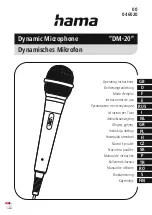
6
AIR TURBULENCE
Avoid exposing the microphone to strong air turbulence.
Ribbon
microphones can withstand very high SPL (Sound Pressure Level),
but can be damaged by a strong gust of air or high levels of very
low frequency sound waves (from a kick drum or bass cabinet). This
can stretch the ribbon, reducing overall output, especially at high
frequencies.
Take precautions when recording any source that moves air. To
avoid damage, follow "The Hand Test": put the back of your hand
where the mic will be positioned; if you can feel the moving air,
place a pop-filter between the microphone and the source or
simply pull the mic farther back. When recording kick drums or
bass guitar cabinets, angle the microphone so that no air blasts the
microphone directly on-axis from the front or back.
Never blow directly into any microphone to test it. Not only
does this force moisture and dirt into the microphone, strong air
movement also can stretch the ribbon and while it may not break,
it nonetheless could significantly degrade the microphone’s
performance. Though the ribbon in your KU4 is protected by
a grille and acoustical fabric, which provides reasonable wind
protection while still allowing good high-end response, take care to
avoid high-wind outdoor environments.
STRAY MAGNETIC FIELDS
Ribbon microphones are fundamentally prone to picking up strong
external magnetic fields generated by light dimmers or nearby
power transformers. Though AEA designers paid much attention
to suppressing such sensitivity, it is still possible that you might
encounter this problem. If you should pick up a hum, try rotating or
moving the microphone to find a spot where the hum disappears,
and try eliminating potential sources of stray magnetic fields.
Rotate or move the mic to find the point of peak interference.
The high-performance magnets used in AEA microphones are
incredibly strong, and a significant amount of stray magnetic field
lines surround the microphone. To prevent data loss caused by
magnetic fields, avoid placing the microphone in close proximity
to hard drives, credit cards, analog tape, or any other magnetically
sensitive items.





























